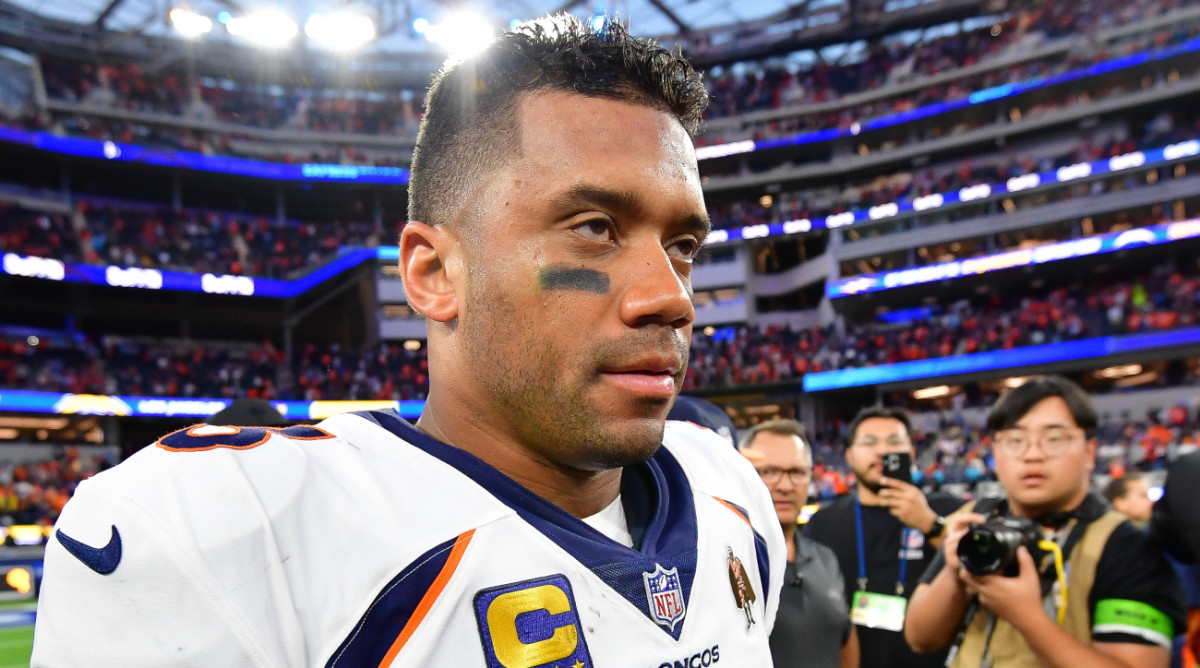SI:AM | The Broncos’ Russell Wilson Mess

Good morning, I’m Dan Gartland. If you haven’t seen it already, I highly recommend the new movie The Iron Claw, about the famous Von Erich wrestling family. I saw it last night. FANTASTIC.
In today’s SI:AM:
🏈 Pro Football Hall of Fame finalists
The Broncos are moving on
Russell Wilson’s tenure with the Denver Broncos appears to be ending.
The Broncos are reportedly benching Wilson for the final two games of the season and will start Jarrett Stidham at quarterback. Although Sunday’s loss to the Patriots dealt a serious blow to Denver’s playoff hopes, the team is still theoretically alive in the postseason hunt. But the move isn’t intended to provide a spark to vault the Broncos into the playoffs. It’s all about maneuvering the salary cap.
Benching Wilson signals that the Broncos are prepared to cut him after the season. If he’s still on the roster in March, his $37 million salary for the 2025 season will become fully guaranteed. That salary also will become guaranteed if he can’t pass a physical in March. In other words, if Wilson were to get hurt in the final two games of the season, it would cost Denver a ton of money.
To be clear, cutting Wilson after this season will still come with a high price tag, but it’ll be slightly cheaper than keeping him for 2024 and having his ’25 salary become guaranteed. Cutting a healthy Wilson will result in $89 million in salary cap charges, compared to $90.8 million if he isn’t released, according to ProFootballTalk. Cutting him also saves the team $37 million in cash by not having to pay his ’25 salary. Denver can also spread the $89 million cap charge over two years if it chooses.
Still, dumping Wilson after just two seasons shows how ill-advised it was for the Broncos not only to trade for him but to then hand him an enormous new contract.
Denver acquired Wilson from the Seahawks in March 2022 in exchange for three players and six draft picks (two of them first-rounders). The two first-round picks were in the top 10 and used to select Charles Cross and Devon Witherspoon, two players who became immediate contributors. The three players included in the deal have also played significant roles for Seattle. Noah Fant became the Seahawks’ starting tight end and caught 50 passes last season. Shelby Harris started 15 games on the defensive line last season before being released as a cap casualty. Drew Lock was the backup to quarterback Geno Smith but led the team to an important win over the Eagles on Monday Night Football two weeks ago. The Broncos would be in a much better position right now if they had that depth.
And then there’s the contract Denver gave Wilson after the trade. He was already under contract through the end of the 2023 season when the trade was made, but then the team immediately signed him to a backloaded extension through the end of ’25. It was a gamble. If it worked out and the Broncos won, it would be easier to live with the high price tag in Wilson’s age-36 and -37 seasons. But it didn’t. Last year was a total disaster that led to the firing of coach Nathaniel Hackett before he even completed his first season. The team has done better under Sean Payton this season, but Payton has repeatedly been critical of the Broncos’ offense. As a coach known for being an offensive guru, Payton deserves some blame for Denver’s pedestrian offense, which ranks in the bottom half of the league in several key categories, but so does Wilson, who at 35 clearly doesn’t have as much left in the tank.
Trading for Wilson and signing him to his massive extension has made the task of building a winning team over the next two seasons much more difficult. The Broncos now face the challenge of trying to build a competitive roster with limited cap space and likely a second-tier rookie quarterback. (At 7–9, they’re currently 14th in the draft order.) Wilson appears to have played his last game in Denver, but his impact will be felt for years to come.
The best of Sports Illustrated

- Conor Orr thinks the Russell Wilson news spells not only the end of his time in Denver, but also his NFL career.
- Matt Verderame looks at how the Wilson trade compares to the worst deals in NFL history.
- Orr also wrote a humorous piece about fantasy football and luck.
- Greg Bishop has a long feature on Eagles defensive tackle Fletcher Cox, who keeps coming back for more even after 11-plus seasons and 187 games at one of the most punishing positions.
- The latest entries in our 2023 year-end series are Rohan Nadkarni on the nonchalant excellence of Nikola Jokić and Stephen Cannella on how the pitch clock brought MLB into the modern era.
- Pat Forde wrote about the absurdity of the money grab Florida State is attempting by trying to leave the ACC.
- Mark Cuban’s sale of the Mavericks was officially approved yesterday. Chris Mannix has more on what the move means for the team’s future.
- Nuggets forward Aaron Gordon is out indefinitely after being bitten by a dog.
- Devin Hester and Antonio Gates headline the list of finalists for the next Pro Football Hall of Fame class. The Packers suspended Jaire Alexander for his bizarre actions during Sunday’s coin toss.
The top five...
… things I saw last night:
5. Caleb Houstan’s assist through a defender’s legs.
4. Luke Hughes’s individual effort on a coast-to-coast goal to tie the game for the Devils with the net empty.
3. Luka Dončić’s behind-the-head assist.
2. ESPN reporter Harry Lyles Jr. dipping french fries in the mayo that had just been dumped on West Virginia coach Neal Brown after his team’s win in the Duke’s Mayo Bowl.
1. Connor Bedard’s overtime game-winner for the Blackhawks. He entered the zone all by himself with three defenders in front of him and buried the shot.
SIQ
Which quarterback is credited with popularizing the term “Hail Mary?” (Today is the anniversary of the game-winning touchdown pass that inspired him to invoke the prayer in a postgame interview.)
- Doug Flutie
- Jim Kelly
- Joe Montana
- Roger Staubach
Yesterday’s SIQ: Which early baseball star, born on Dec. 27, 1887, was known as “the Black Ty Cobb?”
- Spottswood Poles
- Cannonball Dick Redding
- Cyclone Joe Williams
- Bingo DeMoss
Answer: Spottswood Poles. He played the majority of his career before the foundation of the Negro National League, and statistics from that era are far from complete, but he was renowned for being perhaps the best hitter of his day.
Poles, whose name was sometimes shortened to Spot, was born in Virginia and raised in Harrisburg, Penn., where he began playing baseball at age 6. He played for the semipro Harrisburg Giants. He later turned pro, joining the famous Philadelphia Giants in 1909.
While statistics from Poles’s career are scarce, the numbers that do exist are staggering. According to the Society for American Baseball Research, Poles had seasons with batting averages of .440, .364 and .487. He was even better in the few opportunities he had facing white pitchers. According to SABR researcher John Holway, Poles was 25-for-41 in 10 games against white big leaguers during his career. That’s a .610 average.
Poles’s speed and ability to hit for average drew constant comparisons to one of the best players ever—Ty Cobb. He was widely known as “the Black Ty Cobb.”
Poles served with the Harlem Hellfighters during World War I and as a result of his military service was buried in Arlington National Cemetery when he died in 1962.
